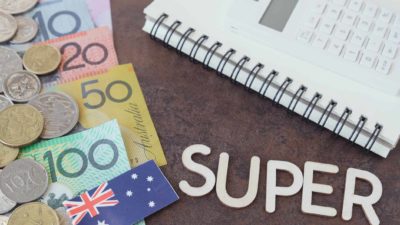Finally, eventually, (and hopefully not prematurely), the state of New South Wales has begun to loosen some of the COVID restrictions that have been in place for the past few months.
And Victoria announced that up to 10,000 people would be able to attend the Melbourne Cup next month. And again, hopefully it's a proportional response and we won't see a related spike in cases.
But in short: Things are moving.
The proportion of the economy that's been truly 'shut down' is remarkably small (at least relative to the large-type 'LOCKDOWN' headlines in the tabloids), with GDP down an uncomfortably large amount, yet not large in absolute terms.
The economy will have shrunk by maybe 5% to 10% over the period restrictions have been in place — a lot, given GDP changes are usually measured in 1% to 2% increments, but it's important to remember that 90% to 95% of economic activity still continued — quite remarkable, during a pandemic.
That sort of fall, in normal times, would still be enough to visit destruction on an economy, perhaps for years, so it's still a huge deal. But much, much better than the headlines might have you believe.
And, of course, it had very different impacts in different industries. Cafes, restaurants and pubs have been smashed. Ditto tourist attractions and, for most of that time, the construction industry.
Online retail and grocery sales soared. So did home furniture, televisions and home office equipment.
These impacts are obviously pandemic-related, but such varied outcomes aren't unusual in downturns — some industries continue to thrive, while others are hurt badly.
To state the obvious, this one was obviously unusual!
And the impacts owe a lot to the times: the people it impacted (mostly lower-paid service staff), those who were unscathed (white-collar workers), the government support (almost everyone in one way or another!), and the huge spike in national savings, thanks to the impact of the aforementioned government support, and the lack of spending from those who would have otherwise travelled interstate and overseas.
Perhaps the biggest impact, in ongoing structural terms, is the rush to buying online. It's a trend that was already in full swing before COVID, but it was turbocharged (and that might be an understatement) by the pandemic, as online sales boomed. Many retailers saw their online sales more than double as a result.
But it wasn't a flash in the pan.
Last month's retail figures, a full 18 months on from the beginning of the pandemic, showed total retail sales in decline (thanks largely to those restrictions), but online sales up 15% — not bad when you think of all of the stuff we've already bought, plus the online retail surge that had already happened over the last year and a half.
But what about the future?
With both states about to open up over the next 6 to 8 weeks, what should we be looking forward to?
As investors, which companies should we be buying?
It is perhaps the question I am asked most often these days, by friends, family and those in the media.
The problem in answering it is twofold. And they both come down to not timing, but time.
See, imagine you're looking at BHP Group Ltd (ASX: BHP).
When you're buying shares today, you're not going to be paid back by this year's BHP profits. Or even this year and next year.
The price of a company's shares should — when the market is being rational — be the total value of all future per-share profits, added together, then 'discounted' because you're not getting all of that money up front.
(In case you're wondering, you should be happy to pay maybe 95c for someone to give you $1 next week, but maybe only 50c if you need to wait 5 years to get that $1… it's the 'time value' of money).
Mathematically, that also means that COVID, the severe (economic) impacts of which will probably only last 18 months or so, shouldn't have made too much of a dent in a company's share price, compared to the profits it'll make over the rest of its corporate life.
Second, again when the market is being rational, it should be forward-looking.
So, by the time we get to mid-October of 2021, and the rollback of restrictions is underway, the market should already have priced that in.
Take, for example, shares in Flight Centre Travel Group Ltd (ASX: FLT).
They were selling for around $35 each in February 2020, right before the COVID crash.
Two months later, they were $9.
And now?
They're back to about $22.50 each.
Not because there are (many) more planes in the air.
Not because their shops are overrun with customers.
Not because they are swimming in cash flow.
But because the market thinks it can see a time when those things will again be true, even before the restrictions end.
And the price is up in anticipation.
Here's the unfortunate truth: the time to buy in anticipation of an event is before everyone else is already anticipating it.
It's why I was suggesting investors should be buying last April, May, June and July.
(And still buying today, putting the benefits of 'dollar cost averaging' in your favour, but that's a different piece!)
Can you still buy travel stocks today and make a quid? Maybe. But most of the 'bounceback' gains have been had.
The time to buy was when everyone else was hating them. When the reopening looked too far away.
Which isn't to say it's easy. And you'll almost certainly miss the very bottom, but such is life.
So, when you hear people telling you which shares you should buy 'because things are bouncing back', be sceptical.
Instead, right now, I've got my attention on two things in particular.
(Fair to say I'm not a 'thematic' investor, so I'll take ideas from everywhere, but I think there are two places worth looking).
The first is 'travel stocks 12 months ago'.
No, I don't have a DeLorean, but if the right time to buy travel stocks was 12 months ago, what will we look back on this time next year and wish we'd bought?
Or, put more simply, what are the unloved stocks of today? Right now, some retail looks very cheap, for example. And a lot of tech has been thrown out with the bathwater in the recent slump. That's two potential sources of return.
The other place I'm looking is more evergreen, but the returns tend to be, too. And that's looking for high performing businesses the market simply undervalues. The growth stories that are likely to keep on growing, well past most fund managers' financial models.
I don't think it's an understatement to speculate that most of the market outperformance over the past couple of decades has come from companies that have grown faster, and for longer, than the market expected.
Think Afterpay Ltd (ASX: APT) here at home, or Amazon (I own shares), Apple or Microsoft in the US.
Not the only place to make money, of course, but a pretty reliable one, which over that time, has tended to do pretty well for investors.
So I'm sorry if you wanted some magic answer to the question of "What should I buy now that NSW is open again?"
But you didn't really think it was that easy, did you?
Good investing is simple… but it's not always easy.
Avoiding the 'too good to be true' answers is a good start.
Fool on!









